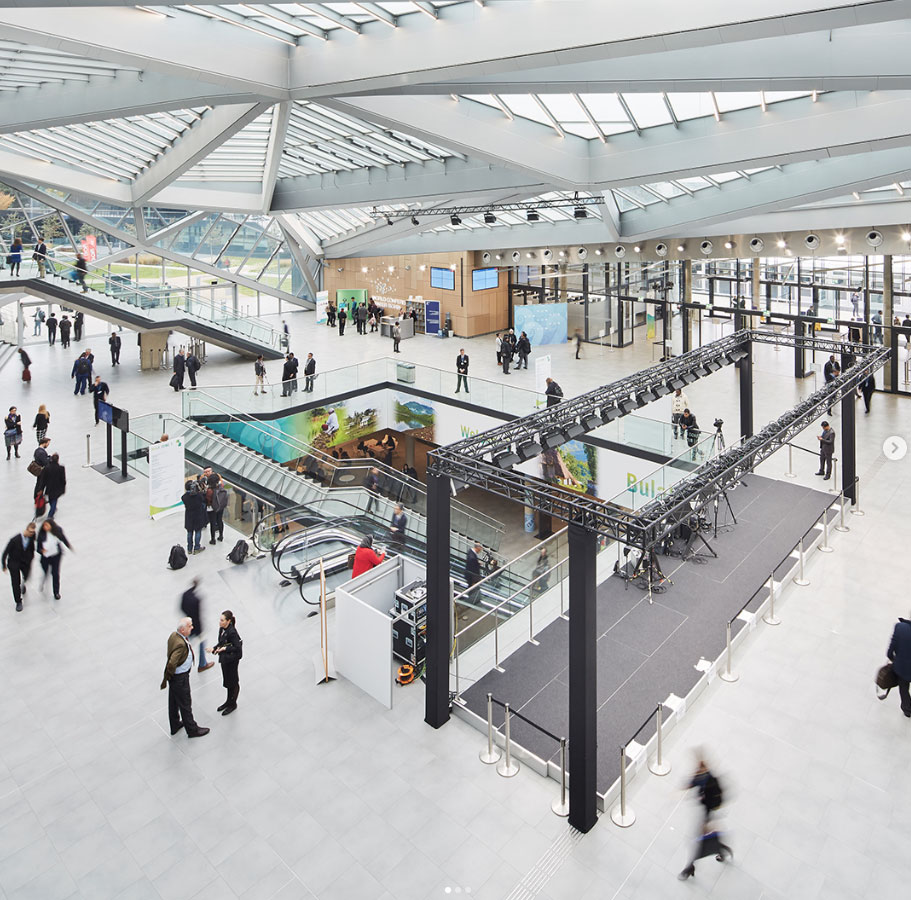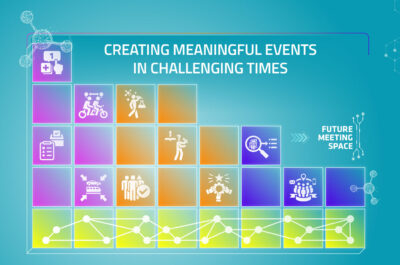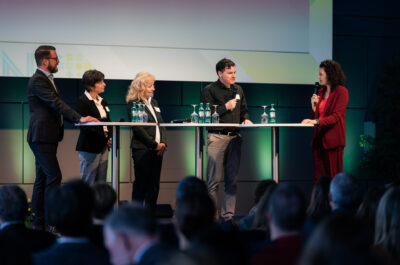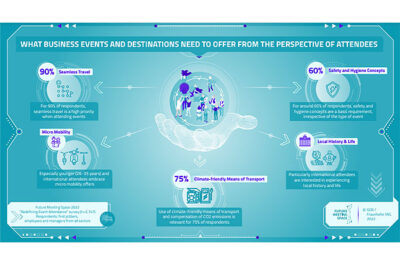The number of international business trips to Germany more than doubled from 5 to 11 million in 2022 compared to the previous year. This means that the business travel segment is recording growth again for the first time after two years of Covid-19-related decline, reaching around 70% of the record level from the pre-crisis year 2019.
FRANKFURT – The German National Tourist Board (GNTB), the GCB German Convention Bureau and the EVVC European Association of Event Centres present the results of the new “Meeting & EventBarometer 2022/2023”. The key figures on the German meetings, congress and event market in 2022 confirm that the number of in-person events has increased significantly, while hybrid and digital formats have decreased. According to the research findings, the market is recovering gradually and at the same time undergoing a progressing structural transformation.
Development of business travel in German incoming tourism
The number of international business trips to Germany more than doubled from 5 to 11 million in 2022 compared to the previous year. This means that the business travel segment is recording growth again for the first time after two years of Covid-19-related decline, reaching around 70% of the record level from the pre-crisis year 2019.
Compared to its international competition, Germany has further expanded its position as the number one business travel destination for Europeans with 9.2 million business trips and leads the ranking by a clear margin over France (4 million business trips) and Spain (2.9 million). Within the business travel market, the MICE segment is gaining in importance post-Covid. 60% of business trips from Europe to Germany in 2022 were promotable business trips, i.e., travel related to trade fairs and MICE. With 67 %, this share was even higher for business trips from overseas markets. At the same time, the recovery of promotable business trips is, at 74%, significantly higher than that of classic business trips.
Petra Hedorfer, chairwoman of the GNTB’s executive board: “The development of this market segment is extremely important for us, as the share of business travel in German incoming tourism from Europe is 20%, i.e., almost twice the European average (11%). Business travellers from overseas even reach a share of 33%. In order to continue to be a part of this recovering market in the future, we need to continuously adapt to the changing market demands as they occur in the course of the ecological transformation: More than half of event organisers state in the Meeting & EventBarometer that their clients expect sustainability to be considered. Many players in German tourism have adapted to these challenges: Almost two-thirds of supplier companies have already aligned parts of their offer portfolio with sustainability in mind, and around one-fifth consider sustainability in their entire supply chain. As the most important reasons for this, the respondents cite on the one hand the saving of resources and on the other hand client expectations , which is important evidence of how ecological transformation, service quality and business success are linked.”
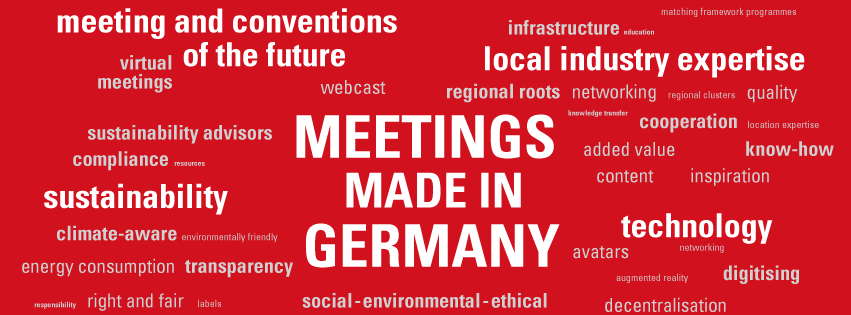
Recovery of German meeting and congress market
The development of the German event market in 2022 underlines its transformative power in the face of multiple challenges as well as the ongoing relevance of business events in the communication mix of organisations. In 2022, the real volume of in-person events (in-person only and hybrid events) returned to 48.5% of the 2019 level. The recovery of the market is emerging with the end of the Covid-19 measures from the beginning of the second quarter until the end of 2022. During this period, event volumes return to 66% of pre-pandemic levels.
The number of in-person event attendees amounts to 172 million. Combined with in-person attendees of hybrid events, this figure is as high as 184 million. This means an increase of 246% in the number of in-person event attendance (2021: 50 million). In addition to in-person attendees, there were 28.5 million online attendees in hybrid events last year (2021: 36.3 million) and 53.4 million attendees in online events (2021: 327 million). While the number of online attendees declined, in-person events with digital elements (hybrid events) proved to be the driving force in the event market. In 2022, a total of 2.6 million events with a total of 266.4 million attendees took place in Germany across all event types (in-person, hybrid, digital).
Boost for role of business events as platforms for knowledge exchange
Business trips are increasing significantly compared to the previous year. Due to the lifting of Covid-19 regulations, congresses, meetings and seminars have become significantly larger (in relation to the number of attendees) in 2022 compared to the previous year. There was a strong shift towards larger events with 101 or more attendees and a correspondingly strong decline in very small events (up to 50 attendees). The need for in-person meetings has increased significantly and puts the relationship to digital and hybrid events into perspective.
“Business events are an essential tools for solving complex issues. People who come together in a professional context ensure knowledge transfer, form networks and thus provide the platforms for developing the answers to the big questions of our time. Particularly in an era of multiple, global challenges, they can support the necessary transformation processes and provide a stage for constructive dialogue on multiple levels and in diverse formats,” says Matthias Schultze, managing director of the GCB German Convention Bureau e.V.
The increase in business trips is also reflected in the numbers of international attendees. Their share in 2022 was 3.9% on average (2021: 2%). This means that although international demand is developing more modestly than the domestic market, there is a clear positive trend.
Sustainability increasingly in focus
The in-person attendees of hybrid events together with the attendees of in-person events only form a growing group of people who want to meet in person. These figures illustrate the need for a dual focus on face-to-face encounters and digital networking, which is confirmed in particular by the organisers surveyed with a view to market development in the coming years.
Particularly with regard to sustainability, the sensible use of digital tools is indispensable. In the current survey, the importance of sustainability is generally rated higher than in the last survey. Around one fifth of the supplier companies has already organised their supply chain sustainably throughout. The vast majority of suppliers surveyed are able to address various aspects of sustainability, while less than 10% of respondents are not actively engaging with the topic. For event organisers, sustainable event management has an importance in the upper range with an average rating of 7.1. Differentiated according to different aspects of sustainability at events, catering is just ahead of CO2 compensation and ahead of a certification system. Overall, sustainability is increasingly influencing corporate decisions and thus the entire event planning process.
Optimistic future forecast
Based on the turnover from 2022, the outlook for 2023 and 2024 is very positive. All suppliers (i.e., all types of event venues) expect a positive turnover development of around 20 % plus for the next two years. Event organisers confirm this positive outlook: 81% expect a good to very good booking situation in the coming months and anticipate budget growth of around 20% by 2023/24. These optimistic forecasts prove that the staging of events is once again in strong demand despite wide-ranging challenges.
Event market increasingly resilient to multiple challenges
Energy supply, inflation and price increases as well as staff shortages are the biggest challenges for the coming years. Among the most frequently mentioned consequences of the various challenges for suppliers are changes in how buildings are managed and greater price pressure from clients. For organisers, rising costs and budget cuts are among the most challenging consequences.
In addition, the demand for staff and skilled workers has increased compared to the previous year. The need for staff is most noticeable in conference hotels. Almost 70% of them state that they are looking for staff, which has an impact on the workload of existing employees. In order to counteract this situation, the focus is on diversity in teams as well as on the stronger promotion of women. Implementing flexible working time models is another step. “Addressing issues around diversity and equality are important approaches to solving the need for skilled staff and contribute to improving companies‘ competitiveness,” says Ilona Jarabek, president of the EVVC European Association of Event Centres.
Outlook
The results of the Meeting & Event Barometer 2022/23 show that the appeal of events is unbroken. In-person event attendance, which makes up the largest share of all attendees across all types of events, underlines the high relevance of in-person events as a communication tool for companies and organisations. Nevertheless, digital formats continue to be of great importance and will continue to play an important role in the communication mix in the future. Beyond the physical space, the digitalisation creates enormous opportunities to expand the reach of events and to include those who cannot or do not want to be present in person for a range of reasons.
Overall, the German meetings and congress market is resilient and fit for the future in the face of the current multiple challenges. In the future, business events will be characterised above all by short-term planning cycles, a higher influence of sustainability aspects as well as increased staff requirements. At the same time, these conditions create a considerable opportunity to drive new innovative solutions that are sustainable and future-proof.
Meeting & EventBarometer 2022-2023 Management SummaryVicky is the co-founder of TravelDailyNews Media Network where she is the Editor-in Chief. She is also responsible for the daily operation and the financial policy. She holds a Bachelor's degree in Tourism Business Administration from the Technical University of Athens and a Master in Business Administration (MBA) from the University of Wales.
She has many years of both academic and industrial experience within the travel industry. She has written/edited numerous articles in various tourism magazines.












